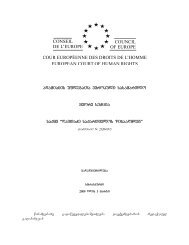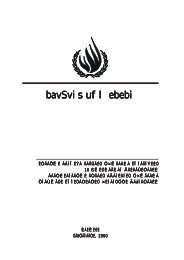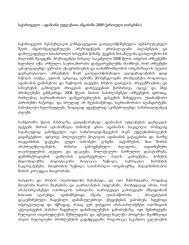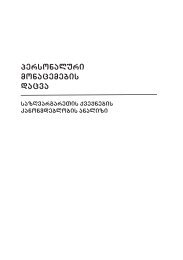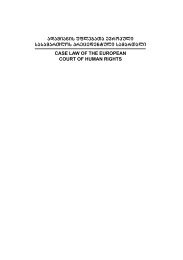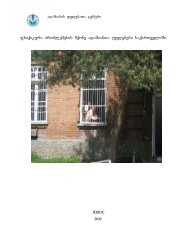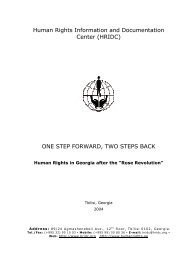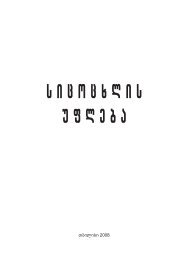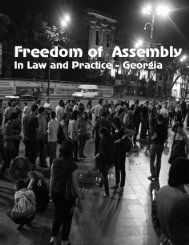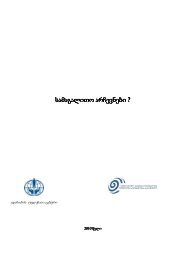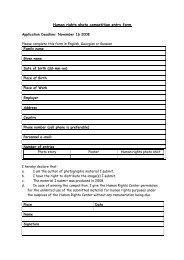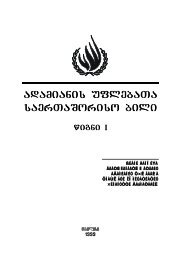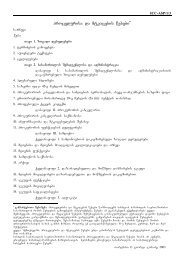Intermediate Report Research of Pre-election Period - The Human ...
Intermediate Report Research of Pre-election Period - The Human ...
Intermediate Report Research of Pre-election Period - The Human ...
Create successful ePaper yourself
Turn your PDF publications into a flip-book with our unique Google optimized e-Paper software.
was put in charge <strong>of</strong> controlling party funding (in accordance with the 2012 Constitutional<br />
amendments, former Chamber <strong>of</strong> Control was renamed the State Audit Office).<br />
<strong>The</strong> main functions <strong>of</strong> the former Chamber <strong>of</strong> Control were regulated by Article 97 <strong>of</strong> the<br />
Constitution <strong>of</strong> Georgia. <strong>The</strong> initial version <strong>of</strong> this article stated that “<strong>The</strong> Chamber <strong>of</strong><br />
Control <strong>of</strong> Georgia shall supervise the use and expenditure <strong>of</strong> state funds and <strong>of</strong> other<br />
material goods. It shall also be authorized to examine the activities <strong>of</strong> other state bodies <strong>of</strong><br />
fiscal and economic control and submit proposals on improving tax legislation to the<br />
Parliament.” <strong>The</strong>se functions and the name <strong>of</strong> the former Chamber <strong>of</strong> Control were changed<br />
by the constitutional amendments <strong>of</strong> May 22, 2012. According to the new amendments and<br />
additions to the Constitution, the State Audit Office shall supervise the use and expenditure<br />
<strong>of</strong> public funds and other material goods – that is, including the non-state expenditure <strong>of</strong><br />
political parties; although this institution already supervised the expenditure <strong>of</strong> political<br />
parties in accordance with the amendments introduced on December 27, 2011 to the Law <strong>of</strong><br />
Georgia on Political Parties. We can assert that from December 27 2011 to May 22 2012, the<br />
Chamber <strong>of</strong> Control carried out activities beyond its realm <strong>of</strong> competency as defined by the<br />
Constitution. We believe this fact can be considered as a significant violation <strong>of</strong> the<br />
Constitution and it must be studied in detail in view <strong>of</strong> the constitutionality and the legal<br />
impact <strong>of</strong> those violations. We can only assume why the Georgian legislative body failed to<br />
respect such an important constitutional amendment in addition to the principle <strong>of</strong> the rule<br />
<strong>of</strong> law. However, we should underline one important fact – unlike in organic law, more<br />
complex and lengthy legislative procedures are required to amend the constitution.<br />
Moreover, any draft constitutional amendment must be publicly discussed for at least one<br />
month. So, unlike in organic law, it is impossible to introduce any amendments to the<br />
Constitution in a limited time-frame.<br />
<strong>The</strong> particular procedures around discussing and passing constitutional amendments stem<br />
from the rule <strong>of</strong> law principle which states that when adopting any law (particularly<br />
14



